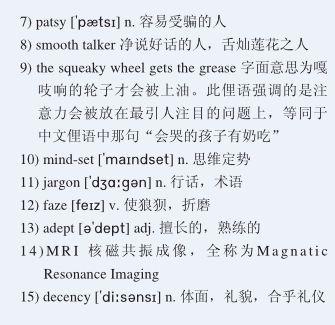优质病患全攻略
2013-07-22byScottHaig,MD
by Scott Haig, MD


The blind, overweight patient in the wheelchair has terrible pain in her back and burning pain in her legs. She also has advanced 1)arthritis in her knees and 2)end-stage circulatory disease, which have left her with two useless legs that are red, 3)swollen and infected. Now her shoulder has started to hurt. She cant raise her arm to comb her hair. Five or six other things are wrong with her—she tells me about each. Some we can help; most we cant. I tell her as much. In my office, she listens carefully. I hardly ever have to repeat myself with Doris. She also asks some questions—mostly good ones. She needs lots of tests, various therapies. I ultimately recommend an operation on her shoulder. Sick, weakened by multiple symptoms and with 4)lousy insurance, Doris is—surprise—a really good patient. She communicates efficiently with her doctors and treats us with respect and trust. She has reasonable expectations.
I can tell she looks things up, but her knowledge is helpful—never challenging. Ive talked about her with other doctors, and we agree on this: when you see Doris name on your days list, you know youre going to work hard. But youre usually glad her name is there.
Few patients realize how deeply they can affect their doctors. That is a big secret in medicine—doctors hate to admit. Actually, We think about, talk about, dream about our patients. We went into clinical medicine because we like dealing on a personal, even 5)intimate level with people who have chosen to put their bodies in our hands. Our patients make or break our days. Take the compliment. Our career choice means we really do think that you—with your aches and pains—are more interesting than trading hot securities, more fun than a courtroom full of lawyers. Massaging the ego is the key to manipulating responsible types like doctors. When we feel your trust, you have us.
The most compelling reasons to be a good patient are selfish ones. You will get more than free drug samples if your doctor is comfortable and communicates easily with you. Youll get more of the mind that you came for, a mind working better because its relaxed—recalling and associating freely, more receptive to small, even subliminal clues. That means better medical care. But you should try to be a good patient for unselfish reasons too. We worry about you 60 hours a week. We gave up our 20s for you. Why not show us some love? Its not hard. The medical relationship is 6)intrinsically one-sided. Its about you and your problem. I am going to find out more about you in the next 20 minutes than you will find out about me. Dont fret about that. We dont expect you to ask much about us. Good patients answer questions accurately and completely. Of course, they ask questions too. But many patients talk too much. You might notice that we are writing when we see you—we are creating your chart. We need specific facts but not every fact in your life.
Heres a classic exchange:
“How long has your shoulder hurt, Beatrice?” “Oh, for quite some time now.”“But for how long? How many months?” “Oh, at least since the wedding—well, then again it did act up a bit when Margaret came back from Ireland…”
All I want to do is write something like“Right shoulder, 6 months, no trauma” on my chart. Although I lack the heart to tell her, Beatrice would be a better patient if she tried to be a bit more concise. However, there are lots of Beatrices.
Heres another classic:
“Well, I dont need to have good manners—Im sick—and Im not going to be a 7)patsy for some 8)smooth talker in a white coat. 9)The squeaky wheel gets the grease, you know.”
That is the 10)mind-set of many patients who abuse their doctors; my bet is they abuse other people as well. Any good doctor knows when youre too sick to be polite and will let it roll off his back. The squeaky wheel we dont like is the one playing a dominance game. That big wheel is likely to get a shorter, less sensitive examination and more tests, and then still more tests to follow up on the abnormalities in the first tests, followed by extra consultations with specialists—anything to relieve the doctors responsibility for a bad patient.
Are doctors good patients? Others may disagree, but I think they are. Medical 11)jargon doesnt 12)faze them, so communication is easier, and their expectations tend to be more reasonable. Anyone in medicine is painfully aware that there are plenty of problems for which we have no good answer. Nurses tend to be even better patients, being 13)adept at following doctors orders—a virtue lacking in doctors. Doctors and nurses also know when to respect an educated opinion. When the 14)MRI says one thing and I want to do another, they are more likely to be on my side. But you need not be a medical profession, or educated at all, to be a great patient. Its pretty much the same strain of human 15)decency—a truthful consideration of the people around you and of what they are trying to do—that infects a good patient and any good person.
那个双目失明、超重的病患坐在轮椅上,她的背部和双腿承受着可怕的、火燎般的疼痛。另外她的膝盖还患有晚期关节炎,而晚期的循环系统疾病也让她已丧失功能的双腿又红又肿,且感染发炎。目前她的肩膀也开始疼痛得抬不起手臂来梳头。她还患有其它五六种疾病——她一一告诉了我。有些我们帮得了,但对于大部分我们无能为力。我把这些都如实告诉了她。在我的办公室里,多丽丝仔细地听着。说一遍她就懂了。她也会问我一些问题——多半都是些好问题。她需要接受大量的检测,各种不同的疗法。最终,我建议对她的肩膀进行一次手术。纵使多丽丝带着病态,也因多重的症状和差劲儿的保险变得越来越虚弱,但她——令人惊奇的是——的确是一个很棒的病患。她与医师们进行有效的沟通,并给予我们尊重和信任。她对自身的病情有着合理的期待。
看得出来她会自己去查一些资料,但是是为了有助于疗治,而不是给医生制造难题。我曾与其他医师谈起过她,我们一致认为:当你在自己的日程表上看到多丽丝的名字时,你就知道你要好好工作了。但你通常会因为看到她的名字在那里而感到愉快。
很少有患者意识到他们能够如此深刻地影响自己的医师。在医学上,这是个大秘密——医师们是不乐意承认的。其实,我们会经常想到自己的患者,谈论他们,梦到他们。我们之所以从事临床医学,是因为我们愿意与那些选择将生命交诸于我们手上的人打交道,甚至是建立亲密关系。我们的日子成也患者,败也患者。请尽情赞赏吧。我们的职业选择意味着我们确实认为你——连同你的疼痛与不适一起——比火爆的证券交易和律师满席的法庭审判要有趣得多。鼓励是笼络有责任感的人群的关键,比如医师们。当我们感觉到你的信任,你也就赢得我们的信任。
成为一名优秀病患的最具说服力的理由还挺自私的。如果你与医师的相处使他感到舒服,并且能与你轻松沟通,你就能够拿到更多的免费药物样品。你会从医师那儿得到你渴望得到的诊治判断,因为在他感到轻松时才能更好地工作——自如地回顾、总结你的病情,并抓住那些细微的、甚至小到无法察觉的细节。这意味着你将得到更好的医疗服务。但你也应该试着为一些无私的理由去当一个好病患。我们每周为你们的病情焦心60小时。为了你们,我们放弃了自己的弱冠年华。为什么不给我们一点爱呢?这并非难事啊。医疗关系本质上是种单边关系,一切都围绕着你以及你的病情。在接下来就诊的20分钟里,我将了解你更多,这远比你对我的了解要多得多。不要着急,我们也不希望你问太多关于我们的问题。优秀的病患能够精确和完整地回答医生的问题。当然,他们也会问一些问题。但是,很多患者讲得太多了。你可能留意到了,当我们与你见面的时候,我们一直在写着什么——我们在创建你的病历。我们需要具体的事实,但不是你生活中的每一个细节。
这儿就有一段经典的医患对话:
“你的肩膀痛了多久了,比阿特丽斯?”“哦,痛了很长一段时间了。”“但,很长是多久?有几个月呢?”“哦,起码从婚礼那时就开始了——对,玛格丽特从爱尔兰回来的时候,又痛了一阵子……”
我无非是想在病历上写一些比如“右肩,疼痛6个月,无外伤史”之类的东西。但是我却没有勇气告诉比阿特丽斯,如果她能试着陈述得更简洁些,她将是一个更优质的病患。遗憾的是,有太多像比阿特丽斯这样的病患了。
这儿还有另外一个经典的例子:
“好吧,我不需要有礼貌——我病了——我才不会轻易上你们这些舌灿莲花的白大褂儿的当呢。会哭的孩子有奶吃,你知道的。”
这是很多折磨医师的病患们所持有的思维定势;我打包票,他们也如此折磨他人。任何优秀的医师都明白病患病情过重无法自控而导致失礼的状况,医师们也会照单全收。我们不喜欢的是那种唯我独尊的“哭闹病孩”。那样的“大架子病患”得到的可能是更为简短、粗略的检查和更多的测试,紧跟着是针对在第一轮测试之后发现的身体异常,再做更多的测试,再然后是一些不必要的专家会诊——任何能够让医师减轻对一个麻烦病患的医疗责任的方法。
医师们会是优质病患吗?其他人可能不同意,但我认为他们是。医学术语难不倒他们,所以他们与医师之间更易于沟通,并且他们的期望也往往更合情理。学医之人都痛苦地晓得医学上有太多令我们束手无策的难题。当护士成为病患时,往往会做得更好,因为她们善于遵循医嘱——而医师们缺乏这种品质。医师和护士也知道何时应当尊重一个专业人士的观点。当核磁共振报出一个结果,而我却不苟同时,他们有可能会更赞同我的观点。但要成为一个优秀的病患,你根本不需要成为一个医学专家,或去接受医学教育。与人类优秀品质的传承如出一辙——真诚地为周遭之人设想并为其将要尝试之事表以关心——这些便造就了一个优质病患和所有好人。
